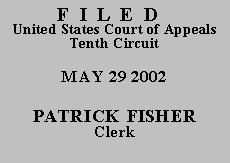

| UNITED STATES OF AMERICA,
v.
ANDRÉ D. NEWMAN |
98-CR-40063-02-DES)
|
Following his arrest in connection with the robbery of two liquor stores, petitioner-defendant André D. Newman pleaded guilty to two counts of robbery in violation of 18 U.S.C. § 1951 (counts 1 and 3); one count of using and carrying a firearm in connection with the count 3 robbery, in violation of 18 U.S.C. § 924(c) (count 4); and one count of conspiracy to commit armed robbery, in violation of 18 U.S.C. § 1951 (count 5). The government dismissed the remaining counts of the superseding indictment. At sentencing, the district court found that a firearm had been "brandished or possessed" in connection with the count 1 robbery, and the court therefore enhanced Mr. Newman's sentence by 5 levels. U.S. Sentencing Guidelines § 2B3.1(b)(2)(C). This court affirmed his convictions and sentence on direct appeal. United States v. Newman, 2000 WL 155582 (10th Cir. 2000) (unpublished).
Petitioner Newman, proceeding pro se, seeks a certificate of appealability (COA) to pursue his appeal of the district court's denial of his motion to vacate, set aside, or correct his sentence, filed pursuant to 28 U.S.C. § 2255. Determining that Mr. Newman has not met the statutory requirements, we deny his application and dismiss the appeal.
To be entitled to a COA, Mr. Newman must make "a substantial showing of the denial of a constitutional right." 28 U.S.C. § 2253(c)(2). He can make this showing by establishing that "reasonable jurists could debate whether (or, for that matter, agree that) the petition should have been resolved in a different manner or that the issues presented were adequate to deserve encouragement to proceed further." Slack v. McDaniel, 529 U.S. 473, 484 (2000) (quotation omitted).
We may grant relief only if the court entered a judgment that
(1) resulted in a decision that was contrary to, or involved an unreasonable application of, clearly established Federal law, as determined by the Supreme Court of the United States; or
(2) resulted in a decision that was based on an unreasonable determination of the facts in light of the evidence presented in the State court proceeding.
28 U.S.C. § 2254(d) (stating the standard for habeas relief from state court judgments); see also 28 U.S.C. § 2255 (stating that denial of a § 2255 motion may be appealed in the same manner as a denial of an application for habeas corpus).
Mr. Newman argues that the district court erred in applying the 5-level weapon enhancement, because he did not personally use or possess a firearm, and that his counsel provided ineffective assistance at sentencing by failing to make this argument. We must reject these arguments, because they are clearly contrary to the Sentencing Guidelines.
The Sentencing Guidelines instruct courts to determine a defendant's sentence based on "relevant conduct," which is defined as:
(A) all acts and omissions committed, aided, abetted, counseled, commanded, induced, procured, or willfully caused by the defendant; and
(B) in the case of a jointly undertaken criminal activity (a criminal plan, scheme, endeavor, or enterprise undertaken by the defendant in concert with others, whether or not charged as a conspiracy), all reasonably foreseeable acts and omissions of others in furtherance of the jointly undertaken criminal activity,
that occurred during the commission of the offense of conviction, in preparation for that offense, or in the course of attempting to avoid detection or responsibility for that offense.
U.S.S.G. § 1B1.3(a)(1). This definition applies to the 5-level enhancement that applies when "a firearm was brandished or possessed" during a robbery. U.S.S.G. §§ 1B1.3(a)(ii); 2B3.1(b)(2)(C). It plainly allows liability for aiding and abetting, as well as for reasonably foreseeable acts of co-conspirators. Contrary to Mr. Newman's contentions, the district court made a finding of reasonable foreseeability at sentencing: "The Court is satisfied that there is sufficient evidence this defendant knew the co-defendants had possession of weapons and that it was reasonably foreseeable the weapons would be used in furtherance of their jointly undertaking criminal activity." Thus, there is no merit to Mr. Newman's assertion that the enhancement was improper because he did not personally possess the firearm or provide it to another. Similarly, there is no merit to Mr. Newman's assertion that his counsel provided ineffective assistance at sentencing by failing to make this argument.
We therefore deny the application for a COA and dismiss the appeal.
ENTERED FOR THE COURT,
Deanell Reece Tacha
Chief Circuit Judge
*.This order and judgment is not binding precedent, except under the doctrines of law of the case, res judicata, and collateral estoppel. This court generally disfavors the citation of orders and judgments; nevertheless, an order and judgment may be cited under the terms and conditions of 10th Cir. R. 36.3.